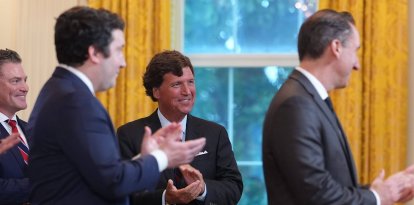Democrats' strategy against Trump's "Big, Beautiful Bill."
Chuck Schumer has given Trump's mega-bill a new name: the "We're All Gonna Die Act." He has also revealed his strategy for trying to stop passage.

Schumer on Capitol Hill/ Allison Robbert
Senate Democratic leader Chuck Schumer has attached his own name to President Donald Trump's "Big, Beautiful Bill." The "We're All Gonna Die Act" was the name the New York senator chose, making a criticism of the Medicaid cuts contemplated by the legislation.
Republicans do not need Democrats to get a simple majority to pass the mega-bill in both chambers, but with such a small majority, they cannot afford to lose more than three Republican votes. Several senators have already voiced their criticisms and concerns regarding the current bill, and Democrats will exploit this weakness to try to sink the legislation.
Schumer presented Senate Democrats with a multifaceted strategy to try to torpedo the process for Republicans. The key points of his plan are to work in tandem with House Democrats and influence public opinion to try to achieve an environment of rejection of the plan that is central to President Trump's agenda.
The senator is working hand-in-hand with House Minority Leader Hakeem Jeffries and top Democrats on House committees that passed the bill to "share firsthand insight from their process and key Republican fault lines." The intent is to attempt to throw roadblocks, using what they see as flaws in the bill, at the Senate approval committees and also learn about weaknesses with which they can ignite discussions among Republicans.
In the Senate, 10 committees will have to review and approve the different chapters of the huge bill. In the text are reflected Trump's policies on taxes, debt ceiling, Medicaid, immigration, and energy, among other aspects.
The Medicaid issue is not just a concern for Democrats, as several Republican senators have already expressed concerns about the cuts and how it could affect their constituents. Among the senators concerned about the Medicaid issue are Josh Hawley of Missouri, Susan Collins of Maine, Lisa Murkowski of Alaska, Jerry Moran of Kansas, and Jim Justice of West Virginia.
Senator Schumer also intends to redouble communication with voters to try to generate pressure on Republicans. He has asked Democrats to strongly denounce and criticize the bill in their states and districts. "If the American people truly knew how deeply devastating, damaging, and deceitful this Republican plan is, they will reject it," Schumer said.
This Wednesday morning, while pointing to a sign that read, "We're All Gonna Die Act," the Democratic leader had this to say: "We're ready to show Americans what's really at stake here, because this fight won't be won in just the Capitol. As Abe Lincoln said, public sentiment is everything. And when public sentiment hears about this 'We're All Going to Die Act,' they're going to hate it, and they're going to tell their senators they hate it."
Republican leaders have repeatedly asserted that the Medicaid cuts are only about ending waste. Speaker Mike Johnson has said there is no reason for a perfectly healthy young person not to be working to pay for health insurance out of his or her own money.
While Republicans don't expect any Democratic votes, the divisions and fights within the party itself are a weakness that Democrats will exploit to try to make it as difficult as possible to pass the mega-bill. In addition to that, we will see in the coming weeks a strong advertising campaign, aimed at Americans, to pressure their congressmen and senators against the bill.
Adding to the Republicans' plight now is the public and strong criticism from Elon Musk, who has even called on Americans to push to "kill the bill." Republicans will have to work hard to bring their representatives and senators into agreement, but they must also effectively communicate the controversial aspects of the bill to the American people.
























